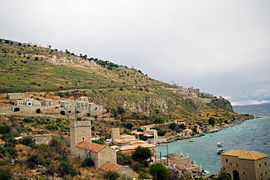Oitylo
|
Oitylo Οίτυλο |
|
|---|---|

View of Limeni
|
|
| Coordinates: 36°42.4′N 22°23.3′E / 36.7067°N 22.3883°ECoordinates: 36°42.4′N 22°23.3′E / 36.7067°N 22.3883°E | |
| Country | Greece |
| Administrative region | Peloponnese |
| Regional unit | Laconia |
| Municipality | East Mani |
| • Municipal unit | 218.582 km2 (84.395 sq mi) |
| Elevation | 251 m (823 ft) |
| Population (2011) | |
| • Municipal unit | 3,515 |
| • Municipal unit density | 16/km2 (42/sq mi) |
| Time zone | EET (UTC+2) |
| • Summer (DST) | EEST (UTC+3) |
| Postal code | 230 62 |
| Area code(s) | 27330 |
| Vehicle registration | ΑΚ |
| Website | www.dimosoitilou.gr |
Oitylo (Greek: Οίτυλο, pronounced Ítilo), known as "Βίτσουλο", pronounced Vitsoulo, in the native Maniot dialect, is a village and a former municipality in Laconia, Peloponnese, Greece. Since the 2011 local government reform it is part of the municipality East Mani, of which it is a municipal unit. It is one of the oldest towns in the Mani Peninsula. It was mentioned in the Iliad by Homer as Oetylοs (Οίτυλος), as part of Menelaus' kingdom. In the Middle Ages, Oitylo grew to become the most important town in Messenian Mani. The only town in Mani that rivaled Oitylos in numbers of pirates was Skoutari. Now Areopoli has taken Oitylo's place as most important town in Laconian Mani. Areopoli was also the seat of the municipality of Oitylo, which is located on the western half of the Mani Peninsula in the extreme southwestern part of Laconia. It has a land area of 218.582 km² and a population of 3,515 inhabitants (2011 census). There are 91 villages in the municipality. The largest of these are Areópoli (pop. 888), Pyrgos Dirou (246) and Oítylo (224).
The municipal unit Oitylo is subdivided into the following communities:
The province of Oitylo (Greek: Επαρχία Οιτύλου) was one of the provinces of the Laconia Prefecture. Its territory corresponded with that of the current municipal unit Oitylo. It was abolished in 2006.
...
Wikipedia


